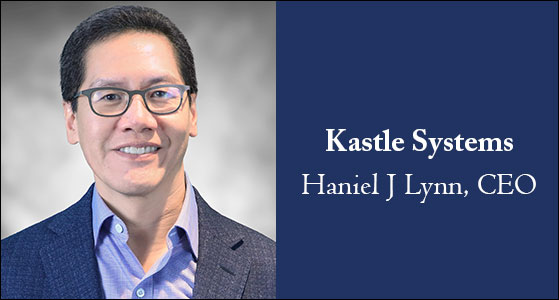10 Best Security Companies 2020
CIO Bulletin

Kastle Systems was founded in 1972 by Gene Samburg who envisioned a more effective, efficient and convenient approach to securing commercial spaces which he called “managed security”. This idea spun out of the need expressed to him by commercial real estate owners in the DC area who wanted an outsourcing solution for the management of their security operations so that they could focus on their core business. The company was purchased by Mark Ein and Piyush Sodha in 2008. Henceforth, Kastle pivoted and started migrating towards a cloud-based security approach, pioneering the Access Control as a Service model. As a result, the company was able to scale rapidly and expand to new markets like the US and Australia. Today, Kastle protects over 10,000 locations nationwide and all over the world.
Last year, Haniel J. Lynnn was picked to be the CEO of Kastle Systems to help the company continue on its rapid growth. We talked to him recently. Here are some excerpts from the interview.
How impactful is cloud and big data on a company’s IT infrastructure and its security today?
In general, cloud computing, big data, and IoT are creating significantly more intersection points between a company’s IT infrastructure and the myriad of interconnected devices and the systems that run businesses today. This leads to more inherent openings for possible cyber attack. However, from our perspective, it’s just more of an opportunity – there are now more potential customers for whom our solution can address core business risk.
More importantly though, our business heavily employs cloud and big data to provide a more secure and robust offering. We are a Managed Security provider, which means that we run the entire physical security operation for our clients’ businesses on a long-term basis – we don’t just sell the system. Cloud computing enables Kastle to provide this service at scale so that we can monitor thousands of customers from our geo-dispersed operations centers.
Do you think security is considered a business enabler, or is there still a tendency to view it as a business inhibitor?
With the rise of cloud computing and IoT ubiquity, physical security is increasingly becoming a business enabler. I believe that security is becoming a driver of convenience and a source of added value for key functions of an enterprise. Access Control is no longer merely about keeping unauthorized people out, but rather it’s become a valuable way of knowing where authorized users are, their identity and when they are present. With open standards integrations, this data can inform other building operations like lighting, air temperatures, elevator destinations, space use planning, and more –helping other Building Management Systems perform more effectively.
Do you think enterprises should embrace AI to drive much advanced cyber security?
In the case of physical security systems being used to protect logical security assets, absolutely. Attackers who can gain physical access to a computer can almost always take advantage of that access to further their efforts. Access Control and Video analytics data (or AI) can be used to pinpoint relevant events in real-time to become more easily searchable and more useful to security staff trying to pinpoint when deviations in operation protocols or historical data patterns take place.
AI can be used predictively, using cloud computing and real time streaming of physical access and video surveillance data events into SIEMs (Security Information and Event Management software) which analyze log, access and video event data to provide threat monitoring, event correlation and rapid incident response.
How is your company distinct from others in the market?
Typically, a business will seek to “buy a security system” (like they buy copiers or computers) from a trusted hardware or software brand or reseller, then have it installed and start to monitor their security themselves. The trouble with this approach is that they are generally not security experts and will frequently run into operational challenges for which they never planned like staff turnover, on-going training needs, ad-hoc maintenance and replacement issues, missing software updates, and other problems for which they have to seek an array of miscellaneous outside vendors which gets expensive and time consuming.
We don’t just sell security products or systems. We provide clients with a complete security solution from design, hardware, software and installation to monitoring, maintenance and ongoing software upgrades provided by a dedicated team assigned to the client – all of this so that the client knows that his/her security is handled by the experts from earliest design to ongoing operations. They can focus on their own business as a result.
Where do you see your company in the forthcoming years?
We seek to grow by leveraging our open-standards interoperability to serve more enterprise businesses with multi-location operations as well as continuing to partner with smart property management platforms.
We’ll also continue to employ technology and design to marry security and convenience to keep our platform on the leading edge of innovation and provide true customer service and better user experience.
As buildings become smarter, having their access control, identity management and video surveillance systems integrating with lighting, HVAC, space design efficiency, etc., the built environment will have increasingly more positive impact on the world’s sustainability – and we want to be there all along the way.
The Visionary
Haniel J. Lynn, CEO
Before joining Kastle Systems, Haniel had a long tenure with CEB (now Gartner). He served as the Group President of CEB’s Best Practices & Decision Support business. He was also the member of the company’s executive leadership team.
He graduated magna cum laude from the University of Pennsylvania. He holds an MBA from the Wharton School.
"Kastle Systems has been leading the security industry for more than 45 years with new technologies and advanced security solutions."
Banking-and-finance
Artificial-intelligence
Travel-and-hospitality
Management-consulting
Banking-and-finance
Banking-and-finance
Food-and-beverage
Travel-and-hospitality
Food-and-beverage